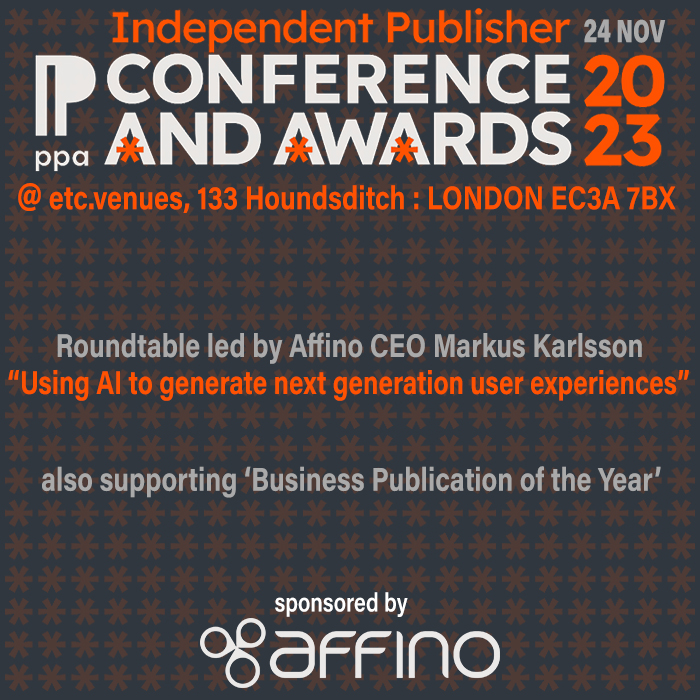The Importance of NLP in Marketing Communications

’New and improved’, ’Transformative’, ’This changes everything’, ’Younger and more supple’... These are several phrases that are more likely to make us sit up and listen, some slightly tired now and over-used, but others which are still successful in hammering home a definitive competitive advantage for those that make use of them. Yet there are still far too many copywriters that do not take benefit from setting themselves a Neuro-Linguistic Programming (NLP) Framework when composing their functional prose.
At Affino we always encourage our Clients to create a full Brand Profile, where they list the various Brand Values, Keywords and Phrases that the company / product / brand stands for. Much like with SEO work - where there should be a degree of repetition and reinforcement, so should be the case with marketing communications - that is to say you use component words and phrases repetitively to drive home a positive association for your potential, intended and current customers.
It’s an advanced form of word association and context. The idea is that positive words or words which inspire positive values, will help your consumers develop a positive image of your company. The aim is to steer wholly clear of any negative words, as consumers focus on differnt things, and may grasp the wrong meaning, may recall the negative rather than the postitive, or simply just see the words in isolation and wrongly associate them with your brand.
Affino’s current positional strapline is ’Collaboration. Solution. Success.’ - in effect encapsulating what we do and what our ’offer’ as such is to our customers.
In our articles and communications, we frequently mention current hot potatoes - ’Unified Platform’, ’Complete digital front-end solution’, ’Seamless customer journeys’ and ’Single customer views’. We also talk significantly about digital business transformation, evolution and innovation. We also touch on improving commercial activities and generating new sources of revenue. All these form a positive image of what we are about and connect those positive actions and activities directly with our brand and our work.
There’s another significant element that needs to be mentioned too - which is tone of voice. You must know whom you are addressing, and how they like to be spoken to. They will have certain trigger words of their own, which may result in an increased or diminished degree of traction with what you are trying to put across. The idea is that you regularly expose them to affirmative vocabulary which familiarises them with you and positively reinforces a favourable image. Equally important, it helps them communicate the right meaning to their colleagues, once they are sold on what it is you are endeavouring to put across.
When I conduct the earliest training sessions for Affino, I always touch on the importance of developing a common reference language for all the project / management team. This includes originating shared naming conventions and shared frames of reference - so that all team members can properly share the responsibility and easily clue colleagues in whenever any sort of handover is required - for reasons of vacation, illness, external meetings etc.
We can’t go into the full process of originating all those words and phrases, as that is part of a much larger program. What we can do though is give clear pointers on the key considerations that need to be made:
Key Considerations for NLP:
No Negatives Ever! - Never say never, don’t or can’t - consciously not using these words is also associated with the very best level of service, everything must be framed and phrased positively - i.e. you should always look for the possible - so instead of saying ’we can’t’, it should be ... ’actually what we can do is ...’
Confidence - try not to ask questions, but offer a more defined frame of guidance, take an authoritative position; too many questions in your message sound like you don’t know what’s going on and introduce uncertainty, where you need clarity and focus
No Jargon - Use plain, simple English, it’s often handy to picture an overseas customer and think how your words communicate the clearest meaning to them too - this does not mean patronising local customers, the tone has to be correct for all
Positive Affirmation - A series of positive statements has an elevating effect for the reader, don’t get caught up in platitudes though
Positive Reinforcement - Using the correct adjectives and adjoining words to add weight to your statement
Repetition - Saying the same thing twice or three times with slightly different vocabulary / emphasis, to make sure that the point sticks
Comparative without hyperbole - ’Better’ and ’More’ rather than ’Best’. Time moves quickly and the market position may have changed already - also some prospects react badly to hyperbole and it often undermines / casts dispersion rather than strengthens your statement - e.g. ’better than the best’, even ’our best ever’ is suspect - it leaves you nowhere to go
Clarity - short, simple sentences, yet with some degree of repetition, otherwise most will be unable to recall what was said
Maximum 3 key points - If you say too much, the consumer will likely get confused and forget the principal points, even the core objective or main call-to-action
Illustration - Use simple descriptive phrases and common metaphors to explain a point where relevant - being mindful of exactly who your audience is
Minimise Cultural Bias - Be careful not to introduce semantics into your communications - such that different consumer groups / nationalities derive different meanings from what you’re saying
Upwards and Onwards - You need to be very aware of what is symbolically associated with positivity and progress - e.g. upwards and right-facing symbols and language - upbeat vs downbeat etc.
Some Examples!:
Try not to say ’cheaper’ or ’lower prices’ as it can imply lower quality; instead say ’better prices’, ’better value’, ’more savings’, ’more for your money’, or ’keener prices’
For luxury or performance cars never use ’economy’ even for ’fuel economy’ as it gives the wrong connotations; instead use ’range’, ’mileage’ or ’reach’
Steer clear of ’not’, ’nothing’ or ’no’ - turn these into positives; instead of saying ’nothing washes cleaner’ say ’delivers dazzling whites’ or ’keeps colours bright and vibrant’ - you could even say ’washes whiter than white’
Don’t say ’Our best ever’; rather say ’our most effective formulation yet’ or similar. ’Best’ leaves you nowhere to go with your next release - you can’t get better than best
Some words actually don’t mean anything; e.g. ’promote’; for instance ’our snack bar promotes a healthier lifestyle’ actually carries no offer; ’low fat’ turns out to be ’high sugar’ and it’s high sugar which actually makes you fatter. Even ’no added sugar’ can be spurious as food / snacks can be made from concentrated pulp, which contains a higher concentration of natural / fructose sugars - most current foods tend to be over-produced these days and typically contains too much added salt and sugar - likely the best thing you can say today is ’all natural and its original state!’
Leave out unnecessary words - you can never be sure which words the audience ends up fixating on - some may well remember something which is there for context, but a red herring versus the core objective; for this reason, every word utilised should be precision-placed to carry just the right meaning, and not to deflect in any way from the core purpose. Any words liable to me misconstrued in any way should not be included ...

Did you find this content useful?
Thank you for your input
Thank you for your feedback
Upcoming and Former Events
Affino Innovation Briefing 2024
Webinar - Introduction to Affino's Expert AI Solutions - Session #2
Webinar - Introduction to Affino's Expert AI Solutions - Session #1
PPA Independent Publisher Conference and Awards 2023
Meetings:
Google Meet and Zoom
Venue:
Soho House, Soho Works +
Registered Office:
55 Bathurst Mews
London, UK
W2 2SB
© Affino 2024





















